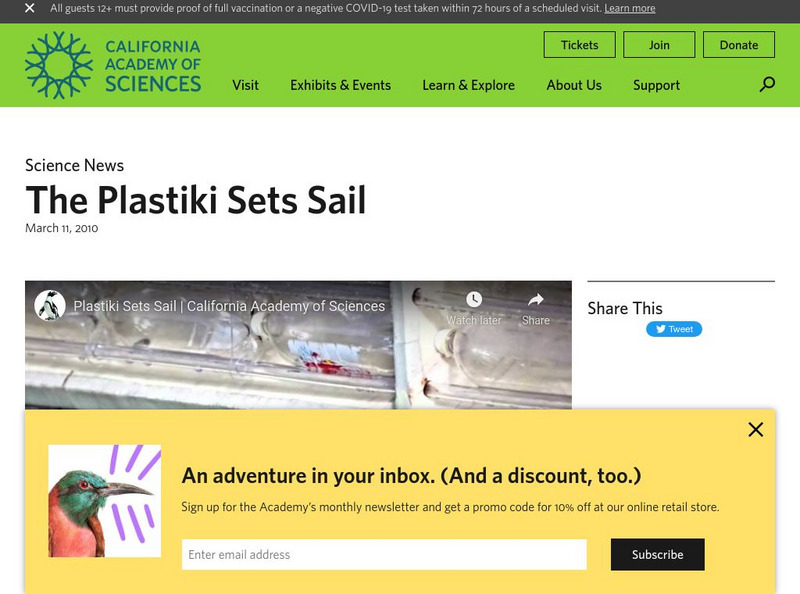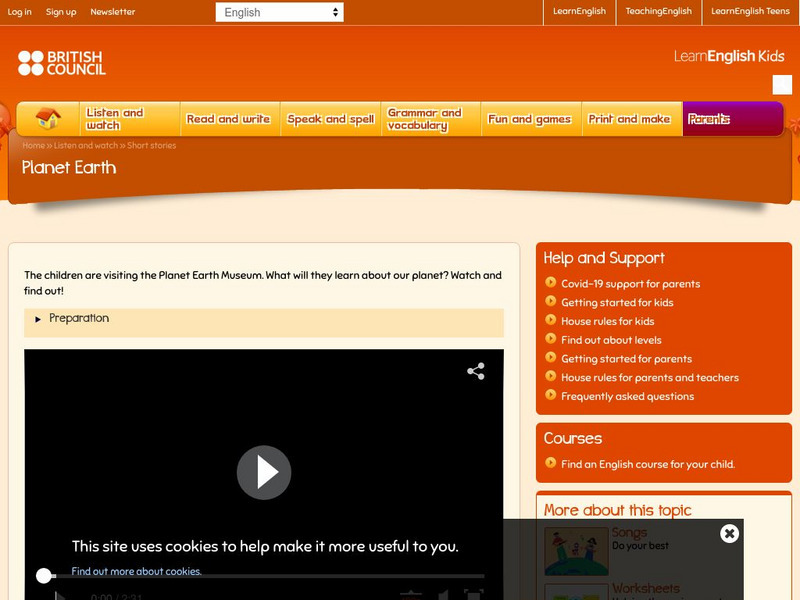Hi, what do you want to do?
TED-Ed
TED-Ed: A brief history of plastic | TED-Ed
For centuries, billiard balls were made of ivory from elephant tusks. But when excessive hunting caused elephant populations to decline, they began to look for alternatives. John Wesley Hyatt took up the challenge. In five years, he...
Curated Video
Innovative Solutions for Ocean Plastic Cleanup
Discover the vital role of sea turtles in marine ecosystems, where they act as keystone species influencing their environment profoundly. This video shows how their dietary habits benefit other marine life and ocean health, highlighting...
Curated Video
Connecting the Dots: Sea Turtles and Ecosystem Balance
Discover the vital role of sea turtles in marine ecosystems, where they act as keystone species influencing their environment profoundly. This video shows how their dietary habits benefit other marine life and ocean health, highlighting...
Curated Video
Plastic Muddled Ocean Turtles - part 1
JP Rothbone plans to dump plastic bags into the ocean, thinking sea turtles will consume them. However, the vigilant Boneheads intercept to thwart his plan, protecting the turtles. While Bonehead daydreams of heroism, T-Bone and Wishbone...
Curated Video
"Hey No More Ocean Plastic" Music Video
"Hey No More Ocean Plastic" is an upbeat song that reinforces the importance of taking care of our environment by reducing plastic waste. Through relatable lyrics and a catchy tune, the song encourages kids to be mindful of their plastic...
Curated Video
Plastic's Path: From Convenience to Crisis
Discover the vital role of sea turtles in marine ecosystems, where they act as keystone species influencing their environment profoundly. This video shows how their dietary habits benefit other marine life and ocean health, highlighting...
Curated Video
Unraveling the Plastic Threat to Sea Turtles
Join host Bobby Donohue at HOPE Headquarters as he explores the impact of plastic pollution on ocean life, especially sea turtles. Learn how plastic waste travels from everyday use to the ocean, posing dangers to marine species like...
Curated Video
Plastic Muddled Ocean Turtles - Part 2
The reality of Bonehead's mission is radically different than his heroic daydream, but he and his team still manage to board JP's airship and stop his cronies from dumping the plastic bags into the ocean. As usual, T-Bone gets all the...
Wonderscape
The Impact of Climate Change and Pollution on the Octopus
This video addresses the critical environmental challenges facing octopuses, including the effects of climate change, ocean pollution, and noise pollution on their survival. It explores how rising ocean temperatures, plastic waste, and...
Wonderscape
Unveiling Ocean Pollution: Hidden Dangers and Urgent Solutions
Join a marine scientist as they uncover shocking evidence of pollution off the Los Angeles coast. Explore the impact of pollution on the environment and learn about the urgent need for solutions. Plastic and Chemical Pollution in Oceans...
Curated Video
Five Facts - Ocean Pollution
This video explores five fun facts about ocean pollution.
Next Animation Studio
Ocean cleaning machine: Australian surfers quit jobs, invent Seabin to clean up ocean
Two Australia surfers are gaining the attention from investors around the world for their invention of a device that helps clean the ocean, according to Australia's ABC News. ABC News reports that Andrew Turton and Pete Ceglinski, who...
Curated Video
Endowment Offers $1 Million for Tech to Get Plastic Out of Oceans
The Endowment for Clean Oceans is holding a contest for anyone with an idea that could remove some of the plastic choking our oceans. Founder Daniel Perrin said there's emerging technology that could help the process, and he wants to...
Curated Video
Starbucks Pledges to Not Suck
The coffee chain announced on Monday that it will eliminate plastic straws from all its stores by 2020 in an attempt to reduce waste and ocean pollution. To achieve that goal, Starbucks will roll out a new lid with a raised lip....
Curated Video
UN negotiating treaty to protect crucial ocean habitats
UN delegates are negotiating a treaty to save international waters from overexploitation. With less than one per cent of international waters protected, environmentalists and scientists alike say the clock is ticking to protect precious...
Press Association
Maritime and Coastguard Agency deploy giant inflatable to test UK's oil spill control.
Footage of the Maritime and Coastguard Agency (MCA) deploying a giant inflatable counter-pollution kit named the Current Buster 6 as part of a major exercise to test the UKs capability to tackle oil spills in Portland. Quotes - Stan...
TED-Ed
What Really Happens to the Plastic You Throw Away
Inspire environmentally conscious young minds with an exceptional video, which traces the life cycles of three different plastic bottles after they are thrown away and move through the earth with different journeys through a...
California Academy of Science
Preventing Plastic Pollution
While plastics don't biodegrade, they do photodegrade, creating issues in Earth's oceans. The final video in the Healthy Oceans series explains why plastic in oceans causes so many issues. the narrator explains the impact of plastic...
Be Smart
How Much Plastic is in the Ocean?
Plastics in our oceans not only create unsightly litter, but they also threaten habitats. A video episode maps the location of the majority of the plastic debris and explains the impact the debris has on our world. The lesson also...
MinuteEarth
Ocean Confetti!
Microplastics exist in our oceans from the Arctic to the Antarctic. Polluting the ocean with plastics creates these microplastics that are so durable they do not break down into organic materials. The video points out that scientists...
Monterey Institute for Technology and Education
National Oceanic and Atmospheric Administration: Ocean Pollution
This learning module explores the effects trash, toxins, oil and sound pollution are having on our oceans. Includes two short videos along with a brief exploration and two interactives. A brief assessment follows each interactive.
California Academy of Sciences
California Academy of Sciences: Plastiki Sets Sail
David de Rothschild and his boat, the Plastiki, sets sail across the Pacific. Find out how a boat made entirely of plastic hopes to rid the oceans of the stuff. [2:46]
PBS
Pbs Learning Media: Above the Noise: Is Your Fleece Jacket Polluting the Oceans?
By 2050, the World Economic Forum predicts that the amount of plastic in the oceans will outweigh ALL the fish. When you hear "plastic" pollution, you might picture six-pack rings wrapped around seagulls or beaches littered with plastic...
British Council
British Council: Learn English Kids: Planet Earth
Take a trip to the Planet Earth Museum to visit the different zones on earth and how they are affected by pollution. Included is a printable activity to reinforce the learning.













